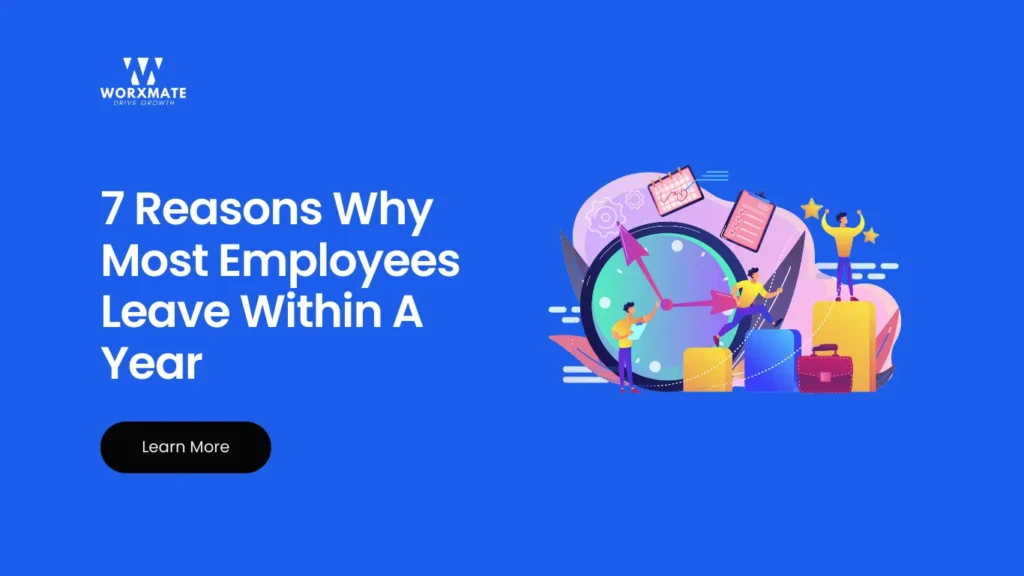Retaining great talent is a challenge that leaders in organisations worldwide and across industries face today. Reducing employee turnover requires an understanding of the factors behind why most employees leave within a year.
Recruiting, hiring, and training employees costs money, time, and effort. Because it can be challenging to find a replacement when employees leave, turnover is expensive. Understanding why employees leave is therefore crucial, particularly when it can assist businesses in identifying practical strategies to lower turnover.
Employee satisfaction with their employer and employment is just as important as managers’ satisfaction with their team. One should be able to comprehend the reasons behind high employee turnover rates in your company and figure out solutions.
This blog will walk you through the 7 reasons why most employees leave within a year and how to stop it. Read on!
7 Reasons Why Most Employees Leave Within A Year
Overwhelming workload
Although new workers are frequently more productive than their contemporaries, they will inevitably get resentful if you assign them additional duties than you do.
Set achievable targets for all employees and look for ways to increase the productivity of employees who are underperforming rather than penalizing new hires for surpassing their peers.
When workers perform well, reward them with promotions or more time off so they don’t feel overworked and mistreated when they leave the company.
Unmatched expectations on both sides
The likelihood that expectations will align increases with as transparent and truthful employers and employees are about their expectations.
By creating practical job descriptions that include a list of important skill sets, managing actual job interviews with each candidate, and hiring from references or interns and freelance workers, organizations can increase the likelihood that they will hire people who match their expectations. Poor performance, low involvement, absenteeism, and repressed rage and retreat are all indicators of unfulfilled expectations.
A Toxic Workplace
Although professional behavior from coworkers would be ideal, not all personalities get along well at work. A toxic workplace might result from interpersonal disputes, office rumors, snooping, or undermining colleagues, which may cause a competent worker to think about leaving. Interoffice rivalry could be another issue.
A competitive workplace may make it difficult for employees to feel as though they can take advantage of their perks or flexible work arrangements without facing consequences, even in cases when vacation time and flexible hours are ample. Employee discontent may also result from having trouble planning holidays or from being discouraged from taking them.
Absence of appreciation or acknowledgment
Lack of acknowledgment is a significant contributing factor to employee turnover. In order to promote a positive corporate culture and improve the bonds between employees and leaders, employee appreciation is essential.
Employee productivity declines when they don’t receive recognition. Regular employee recognition requires employers to come up with suitable methods. In a meeting, it may be as easy as giving them a shoutout.
Not gaining knowledge
Sometimes feeling stuck is enough for workers to leave their positions; they don’t need a full list of reasons. This is also one of the main reasons why most employees leave within a year.
It’s time to find something new that challenges them once more if they have accomplished all and excelled at what they do now but no longer feel challenged or like they are learning new things. Consider how you may apply their abilities in a different department or role inside the business.
No flexible work options
The majority of workers nowadays leave their current position in search of one that offers more flexibility. Employee engagement, satisfaction, and productivity can all increase with flexible work arrangements.
Nowadays, most businesses provide greater flexibility when it comes to work in an effort to keep the finest employees. Companies may even be able to overcome current and upcoming obstacles with flexible work arrangements.
Insufficient Pay and Benefits
When workers feel underappreciated or underpaid, they look for better chances. Key retention variables include competitive pay and extensive benefit packages.
Improved pay and extensive benefit plans are essential for keeping employees on board, and a lack of competitive pay is the main cause of employee turnover. Employees are more likely to look for work elsewhere if they believe their contributions are not valued or compensated appropriately. A lack of decent salaries, medical benefits, and job flexibility forces most employees to leave within a year.
How To Stop It
Using the following best practices for higher employee engagement and retention will have a good effect on your employees.
Provide Hybrid Or Remote Choices
If you haven’t already, think about putting remote work best practices into effect and, if at all possible, allowing work-from-home and hybrid work arrangements. Not mandating full-time in-office presence can improve your present employee relationships and increase your appeal to skilled job searchers. Today’s workers value flexibility.
Show Empathy In Your Leadership
Leaders must have empathy, particularly if they are managing a group of talented employees and hope to retain them over the long haul. You should treat your staff members as individuals, not simply as workers, as a manager or supervisor. Your staff will be more inclined to go above and above if you do this.
Provide Competitive Benefits And Compensation
Provide competitive pay and benefits that honor the efforts and worth of employees while still being in line with industry norms. Make sure that pay structures are competitive and accurately represent the abilities and expertise of employees by reviewing and adjusting them on a regular basis.
In order to improve employee happiness and retention, you should also offer alluring advantages like healthcare, flexible work schedules, retirement plans, and chances for professional growth. To further encourage staff to stay, think about providing extra benefits like wellness initiatives, employee coupons, or extra learning discounts.
Maintain The Morale Of Your Team
Make sure the workload for your team is balanced. As a temporary fix, when individuals leave, their work is sometimes piled on top of the remaining team members. Avoid making this unequal work distribution a permanent arrangement without more pay. As you welcome new hires, make sure that work is properly redistributed and keep your personnel informed about recruitment.
Final Word
A workplace that retains employees and encourages their happiness can be achieved by acknowledging and addressing these issues. Performance management software like Worxmate helps organizations track employee progress, provide real-time feedback, and create personalized growth plans.
Organizations can lay the groundwork for long-term success by promoting a work environment that complements employees’ needs and values. The bottom line is that you cannot take your employees for granted.
Meeting their requirements and providing them with a compelling reason to stay is essential if you want top talent to stick around with your organization for an extended period.



